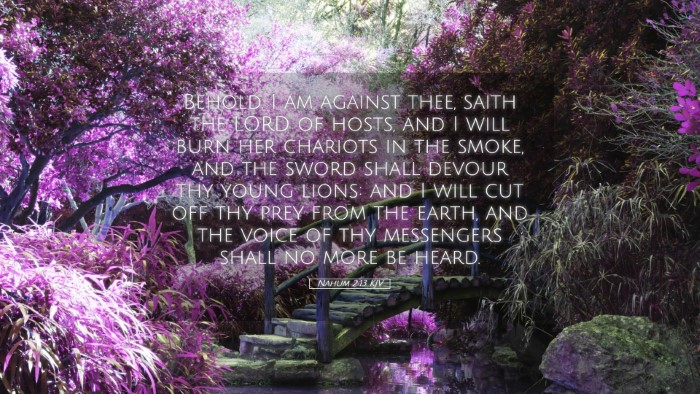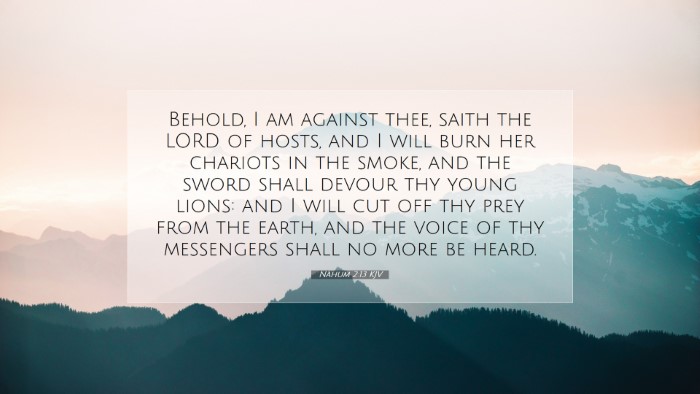Old Testament
Genesis Exodus Leviticus Numbers Deuteronomy Joshua Judges Ruth 1 Samuel 2 Samuel 1 Kings 2 Kings 1 Chronicles 2 Chronicles Ezra Nehemiah Esther Job Psalms Proverbs Ecclesiastes Song of Solomon Isaiah Jeremiah Lamentations Ezekiel Daniel Hosea Joel Amos Obadiah Jonah Micah Nahum Habakkuk Zephaniah Haggai Zechariah MalachiNahum 2:13
Nahum 2:13 KJV
Behold, I am against thee, saith the LORD of hosts, and I will burn her chariots in the smoke, and the sword shall devour thy young lions: and I will cut off thy prey from the earth, and the voice of thy messengers shall no more be heard.
Nahum 2:13 Bible Commentary
Commentary on Nahum 2:13
Nahum 2:13 states: "Behold, I am against you, says the LORD of hosts; and I will burn your chariots in smoke, and the sword shall devour your young lions; I will cut off your prey from the earth, and the voice of your messengers shall no longer be heard."
Contextual Overview
The Book of Nahum is a prophetic text that proclaims the impending judgment of God upon Nineveh, the capital of Assyria. The message is one of assurance to Judah, as it emphasizes the downfall of their oppressors and the restoration of God's people.
Insights from Matthew Henry
According to Matthew Henry, this verse serves as a divine declaration of war against Nineveh. God's opposition to the city emphasizes His sovereign authority over nations and their rulers. Henry notes the following key aspects:
- Divine Opposition: "I am against you" signifies not only personal hostility but also a broader cosmic conflict where God actively works against those who oppose His people.
- Destruction of Military Might: The burning of chariots symbolizes the dismantling of Nineveh’s military superiority. Chariots were a sign of strength in warfare; thus, their destruction represents the total collapse of Nineveh’s power.
- Judgment on the Young and Innocent: The mention of "young lions" can be seen as a metaphor for power and strength. God's judgment extends to both the leaders and the vulnerable, indicating a comprehensive judgment.
Reflections from Albert Barnes
Albert Barnes offers an exploration of the metaphorical language used in this verse. He suggests:
- Comprehensiveness of God's Judgments: The Lord's proclamation includes various judgments: destruction of chariots, slaughter of the young lions, cutting off of prey, and silencing of messengers. Each element signifies a different aspect of divine retribution.
- Theological Implications: Barnes emphasizes that this verse underscores God's active role in history. The language used reflects both the judgment upon Assyria and a promise of security and protection for Israel.
- Lamentation of the Assyrians: The fate of the Assyrians is a warning and a lament, as they will become a shadow of their former glory, bereft of power and influence.
Views from Adam Clarke
Adam Clarke provides a detailed linguistic and contextual examination, pointing out several aspects:
- Cultural Context: Clarke highlights that Nineveh's strength was seen in their military prowess. The aquatic imagery (e.g., chariots compared to smoke) denotes the fear and confusion that would engulf the Assyrian army at God's intervention.
- Symbolism of Lions: Clarke further discusses the significance of young lions, which symbolize cruelty and power in Assyrian culture. Their destruction indicates a divine reversal of fortune.
- Prophetic Assurance: The statement regarding messengers ceasing to be heard is a powerful image of silence and defeat. Instead of heralding news of conquest and terror, they will be forgotten, reflecting God's omnipotence.
Theological Themes
This verse highlights several overarching theological themes:
- The Sovereignty of God: The proclamation "I am against you" stresses God's authority over nations and His capacity to execute judgment.
- Hope for the Righteous: While delivering a message of judgment, Nahum's prophecy also offers hope to Judah, indicating that their suffering is seen by God and that justice will prevail.
- Justice and Mercy: God’s judgment is not only about wrath but encompasses the broader idea of justice, where oppression is answered with accountability.
Conclusion
Nahum 2:13 serves as a powerful declaration of divine judgment against Assyria, illuminating the themes of God’s sovereignty, the inevitability of divine justice, and the assurance provided to God’s people during times of distress. The insights gleaned from Matthew Henry, Albert Barnes, and Adam Clarke enrich the understanding of this prophetic message and underscore its relevance for contemporary readers, encouraging reflection on God's active role in history and His unwavering commitment to justice.


